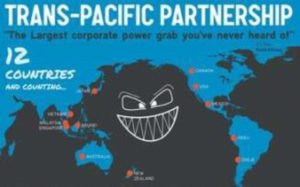Fools or liars on the TPP? – Dean Baker

Given the recent flood of op-eds and editorials on the wonders of the Trans- Pacific Partnership (TPP), the Obama administration must be about to present the deal to Congress for approval.
Otherwise, it’s hard to see why so many pieces would spontaneously appear on the TPP. Since there is real money at stake, we can expect the debate to get pretty low and nasty, with the pro-TPP forces substituting ad hominems and claims to expertise for serious arguments.
My favourite on the lack-of-argument side is the exciting news that if the TPP were approved it would eliminate some 18,000 tariffs on U.S. exports to the countries in the deal. That sounds like a huge boon to trade, right? Well, Public Citizen looked up the 18,000 tariffs that would be eliminated. It found that the
U.S. is not currently exporting in more than half of the categories in which these tariffs apply. Included in the list of tariffs to be removed are Malaysia’s shark fin tariffs, Vietnam’s whale meat tariffs, and Japan’s ivory tariffs.
The overwhelming majority of these tariffs are of little consequence in very narrow product categories, like Brunei’s tariff on ski boots. So when the proponents of the TPP tout the 18,000 tariffs, is this because they have no clue what they are talking about, or are they deliberately trying to deceive the public?
But this is just the beginning of the fun when it comes to the TPP. The very pro-TPP Peter Peterson Institute for International Economics produced a study showing that the deal will add 0.5 percentage points to GDP when its effects are fully felt in 2030. While this
projection is supposed to convince people of the huge benefits of the TPP, taken at face value it means we will be as rich on January 1, 2030 as we would otherwise be on March 15, 2030.
But even this limited projected gain is dubious. The model used to project this result explicitly assumes that the TPP cannot increase unemployment. If people are concerned that the TPP will lead to a further rise in the U.S. trade deficit, which would cost jobs, the Peterson Institute model has nothing to tell them on the topic. It rules out this possibility by assumption.
The Peterson Institute has a long track record of pushing trade deals and dismissing concerns about trade deficits and unemployment. Back in 2000, it published a paper that dismissed as “extravagant” the concerns raised by Rob Scott, my former colleague at the Economic Policy Institute, that admitting China to the W.T.O. will cost 817,000 jobs.
Scott ended up being far off the mark on this one. The actual job loss figure was probably close to three times his projection. Of course, the story with China was its decision to deliberately hold down the value of its currency, which allowed it to run massive trade surpluses with the United States and other countries. In spite of demands by members of Congress and numerous economists, including Fred Bergsten, the Peterson Institute’s former president, the TPP includes no provisions that will prevent currency management by the countries in the pact.
But the real story of the TPP is that it has little to do with trade. After all, we already have trade agreements with six of the other 11 participants in the deal. After NAFTA, there are not many trade barriers to remove with Canada and
Mexico. The deal is about putting in place a pro-business regulatory structure. It was largely negotiated by some business trade groups who crafted a deal to boost their profits.
The TPP will put into question every health, safety, and environmental regulation that governments at any level seek to implement. The assurances from the Obama administration to the contrary on this front are absolutely worthless. The TPP sets up an extra- judicial system, not bound by precedent and not subject to appeal, which can impose large fines for any measure it chooses. Former President Obama will not be pulling money out of his personal bank account to compensate anyone if his assurances prove to be wrong.
But the most pernicious part of the deal is its extension of protectionism in the form of stronger and longer patent and copyright protection. This will raise the price of the protected products, most importantly prescription drugs.
While the public in the United States has been focusing on making drugs cheaper, our TPP negotiators were working to make them more expensive. High drug prices are a serious problem in the United States; they can prove deadly in poorer countries where large segments of the population can’t afford to pay Pfizer tens of thousands of dollars for the drugs on which it holds patent monopolies. Incredibly, it doesn’t seem the Peterson Institute folks included the impact of these protections in its modeling of the TPP.
The long and short of it is that the TPP offers almost none of the classic benefits associated with free trade, since it does very little in terms of reducing trade barriers. The deal is all about increasing corporate profits at the expense of the public in all of the countries that are parties. And you are stupid protectionist Neanderthal if you don’t go along. Got it?
Source: Real World Econ Rev 24 Mar 2016 https://rwer.wordpress.com/2016/03/24/fools-or-liars-on-the-trans-pacific-partnership/

Dr Dean Baker is a U.S. macro- economist and co-founder of the Center for Economic and Policy Research, with Mark Weisbrot. He previously was a senior economist at the Economic Policy Institute.



















